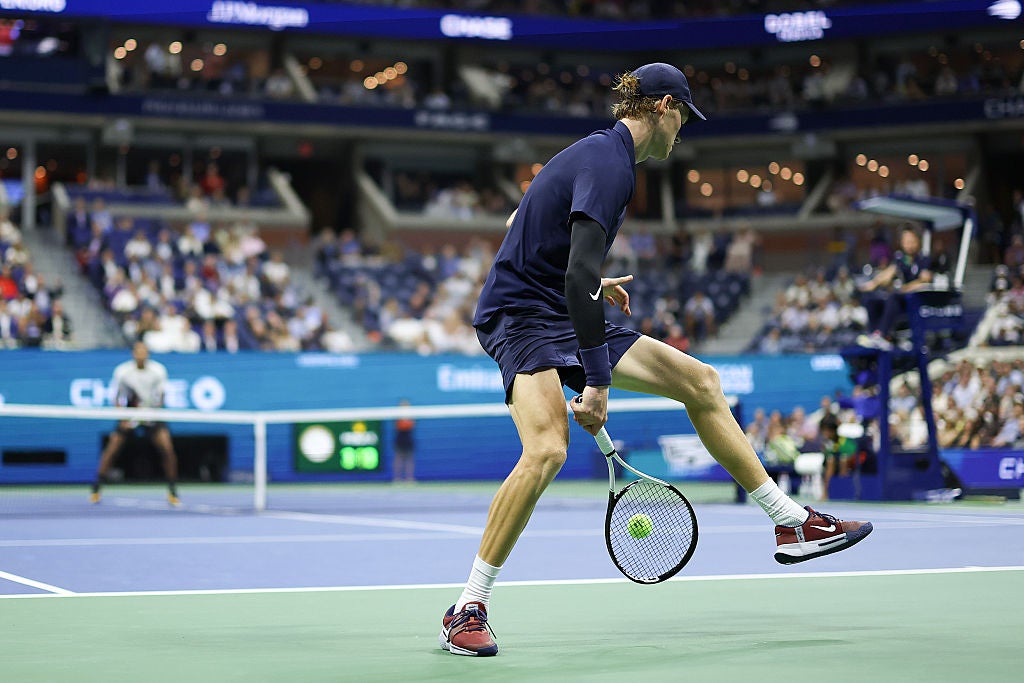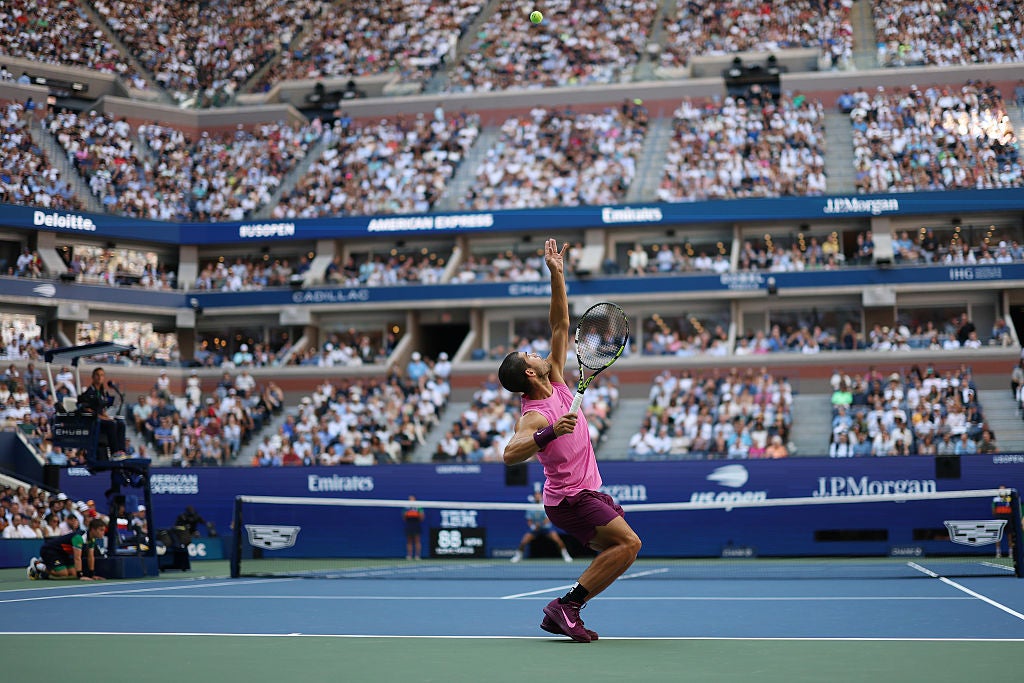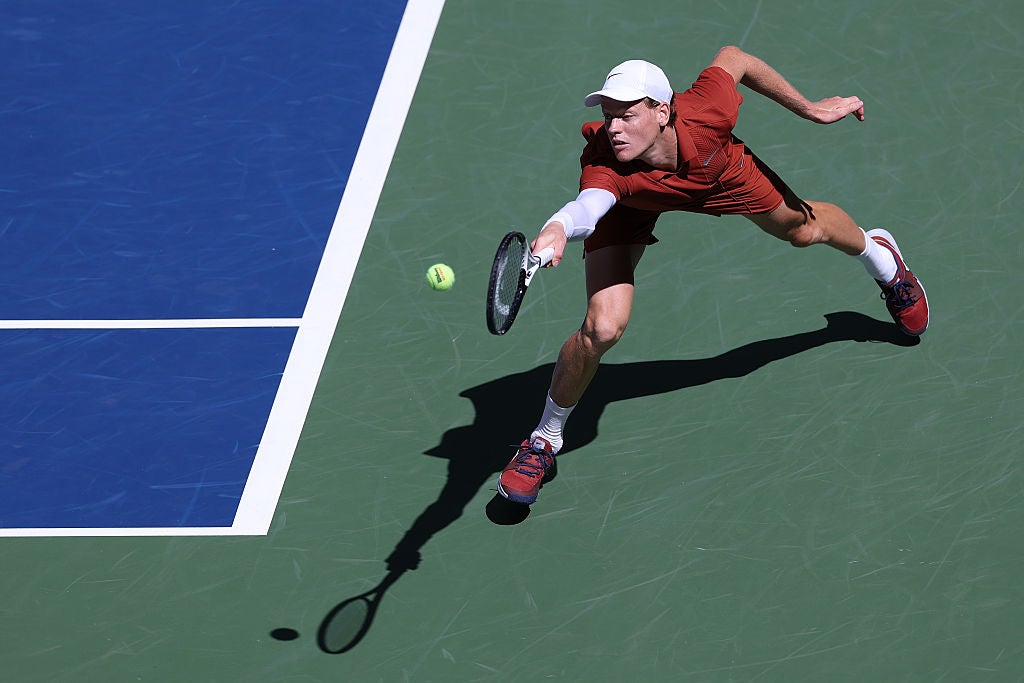Partway through Ben Shelton’s Wimbledon fourth-round meeting with Lorenzo Sonego, one man in the press box turned to his companion and asked who the winner would face next. “Jannik Sinner,” the other replied confidently.
Never mind that Sinner had yet to play his quarter-final with Grigor Dimitrov. The result was taken as read. Death, taxes and Jannik Sinner winning, to paraphrase the saying. (Ironically, Dimitrov then came a set away from a huge upset before retiring injured).
But the point stands that Sinner, the world No 1, a four-time grand slam champion, and Carlos Alcaraz, world No 2 and five-time grand slam champion, are a cut above the rest of the field. After Sunday’s clash in New York, they will have won the last eight majors between them and contested the three most recent finals among themselves. It is the first time in the Open era that the same two players will contest three of the four slam finals in a season.
This is the era of “Sincaraz”, as dominant and ruthless as the previous era of the “Big Three”. Their rivals and challengers ruefully admit the pair are streets ahead of everyone else.
Stefanos Tsitsipas, part of the much-maligned 1990s generation of players who never quite reached the top, summed up why Alcaraz and Sinner are nigh on untouchable. “They are the ones shining,” he said, in his usual poetic style, in a press conference earlier this summer.
“It shows you how much more physical and mental tennis has become. Their concentration levels, especially when they really want it badly, it’s really tough to find another player who can get close to their levels. They’ve got the whole package, they can play every single shot, and tennis has developed into this aggressive, physical sport that 10 years ago didn’t exist as much, wasn’t intensified [so much].”
So how do you go about beating them?
.jpeg)
The man best placed to disrupt their duopoly remains, at the advanced age of 38, Novak Djokovic, still the third-best player in the world despite a host of physical issues. “I know that my best tennis is going to be required, but I’d rise to the occasion,” the Serb said before his semi-final with Alcaraz.
After a straight-set loss, he noted that the unparalleled intensity of grand slam tennis put him at a disadvantage straight away. “I ran out of gas after the second set,” he said. “Best-of-five makes it very, very difficult for me to play them. I’m happy with my level of tennis, but it’s just the physicality of it, you know.”
Djokovic’s period of sustained dominance over the sport was as notable for his psychological hold over his opponents as much as his incredible standard of tennis. Now he is on the other side of the net, figuratively. “I definitely am not going with a white flag on the court,” Djokovic said. “I don’t think anybody does really when they play them, but particularly not me.” He may speak for himself, but there is an element of the rest of the tour being in awe of Alcaraz and Sinner in the same way they once were – and many still are – of Djokovic.
Even before his fourth-round match with Sinner, Alexander Bublik – remarkably, the only man besides Alcaraz to have beaten the Italian this year – sounded defeated, saying his opponent was “like an AI-generated player”. That feels unfair on Sinner, who at least allowed Bublik three games in a 6-1, 6-1, 6-1 beatdown, with the Kazakh wryly celebrating avoiding a third-set bagel.

Another Italian, 10th seed Lorenzo Musetti, was left to muse how to bridge the gap to the pair after a quarter-final loss to his compatriot. “I think with an opponent like him, you have to take the few chances that he gives you, and I was not able to do it,” he said. “I never played, honestly, someone who put me in this kind of rush in the rally, and he was always leading the rally.”
Felix Auger-Aliassime, who faced Sinner in the semi-finals, took a practical approach. “Honestly, the next match I’m not really going to focus on my opponent more than myself. I need to play good tennis. There is no other way.” He lost in four sets, but struck a positive note after his best slam performance in four years, speaking proudly of “the belief, the mentality, the conviction in myself that I have what it takes to win these types of matches”.
Easier said than done, as Czech 20th seed Jiri Lehecka found out in a lopsided straight-sets defeat to Alcaraz in their quarter-final. The 23-year-old said ruefully afterwards, “I think today I kind of met the grand slam version of Carlos. I think that the most important things which he needed to do, he did better than me. If you want to beat him, you need to win at least a few of the big points, and he won all of them.
“Even when I played a really good rally, even when I tried to put him under pressure, go to the net, change the rhythm, do something, he was there, and he had an answer for everything I tried. He always managed to do something special.” The Czech mused: “I think that on the grand slam stage when he knows that he has more sets to find his rhythm, he’s a little bit more free [in] how he plays.” Ominous for the rest of the field.

Besides Auger-Aliassime, the only player to have challenged either Sinner or Alcaraz in New York has been Denis Shapovalov, a similarly talented player in his early years, with vicious shotmaking and an all-out, offensive game. He raced to a 5-2 lead in the opening set of his third-round match against an out-of-sorts Sinner and had a break point to go 4-0 up in the third set, but ultimately lost in four.
Sinner’s escape was helped by Shapovalov losing intensity and focus at key moments, but it provided a glimmer of hope for his opponents. Even the best have off-days… but he still won the match.
Shapovalov said afterwards: “We were going toe to toe. I was playing with a lot of variety; I was mixing things up pretty well against him. I was trying to make it as difficult as possible while still trying to implement my game and try to play aggressively.

“But, of course, he’s No 1 for a reason. He fights extremely well. Yeah, I need to learn from my mistakes today, try to almost stay even more solid.”
There is no room for error against two players with seemingly all the answers. But as Shapovalov said: “I was able to put pressure on Jannik today, so, you know, who says that another player can’t do the same?”
It will be some time before we find out, with the pair set for a clean sweep of the grand slams for the second year running. Djokovic admitted: “If I’m to lose to someone, I would lose to these two guys. I know that they are just better at the moment. You just have to hand it to them and say, well done.”


